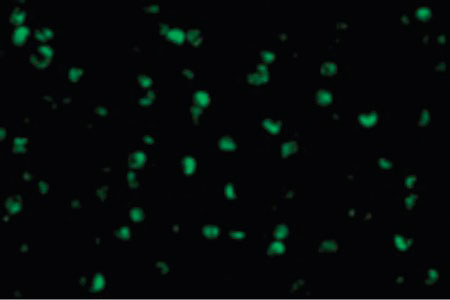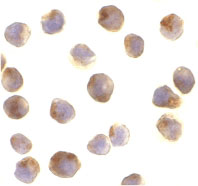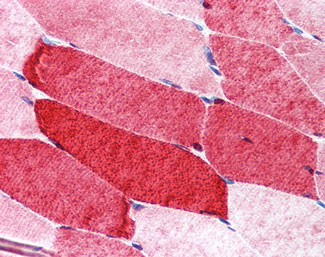Raptor / Mip1 Antibody (N-Terminus)
Rabbit Polyclonal Antibody
- SPECIFICATION
- CITATIONS
- PROTOCOLS
- BACKGROUND

Application
| WB, IHC-P, IF, ICC |
|---|---|
| Primary Accession | Q8N122 |
| Reactivity | Human, Mouse |
| Host | Rabbit |
| Clonality | Polyclonal |
| Calculated MW | 149kDa |
| Dilution | IHC-P (5 µg/ml), WB (2 µg/ml), |
| Gene ID | 57521 |
|---|---|
| Other Names | Regulatory-associated protein of mTOR, Raptor, p150 target of rapamycin (TOR)-scaffold protein, RPTOR, KIAA1303, RAPTOR |
| Target/Specificity | 13 amino acid peptide from near the amino-terminus of human Raptor |
| Reconstitution & Storage | Short term 4°C, long term aliquot and store at -20°C, avoid freeze thaw cycles. Store undiluted. |
| Precautions | Raptor / Mip1 Antibody (N-Terminus) is for research use only and not for use in diagnostic or therapeutic procedures. |
| Name | RPTOR (HGNC:30287) |
|---|---|
| Function | Component of the mechanistic target of rapamycin complex 1 (mTORC1), an evolutionarily conserved central nutrient sensor that stimulates anabolic reactions and macromolecule biosynthesis to promote cellular biomass generation and growth (PubMed:12150925, PubMed:12150926, PubMed:12747827, PubMed:24403073, PubMed:26588989, PubMed:32561715, PubMed:37541260). In response to nutrients, growth factors or amino acids, mTORC1 is recruited to the lysosome membrane and promotes protein, lipid and nucleotide synthesis by phosphorylating several substrates, such as ribosomal protein S6 kinase (RPS6KB1 and RPS6KB2) and EIF4EBP1 (4E-BP1) (PubMed:12150925, PubMed:12150926, PubMed:12747827, PubMed:24403073, PubMed:26588989, PubMed:37541260). In the same time, it inhibits catabolic pathways by phosphorylating the autophagy initiation components ULK1 and ATG13, as well as transcription factor TFEB, a master regulators of lysosomal biogenesis and autophagy (PubMed:12150925, PubMed:12150926, PubMed:12747827, PubMed:24403073, PubMed:32561715, PubMed:37541260). The mTORC1 complex is inhibited in response to starvation and amino acid depletion (PubMed:12150925, PubMed:12150926, PubMed:12747827, PubMed:24403073, PubMed:37541260). Within the mTORC1 complex, RPTOR acts both as a molecular adapter, which (1) mediates recruitment of mTORC1 to lysosomal membranes via interaction with small GTPases Rag (RagA/RRAGA, RagB/RRAGB, RagC/RRAGC and/or RagD/RRAGD), and a (2) substrate-specific adapter, which promotes substrate specificity by binding to TOS motif- containing proteins and direct them towards the active site of the MTOR kinase domain for phosphorylation (PubMed:12747827, PubMed:24403073, PubMed:26588989, PubMed:37541260). mTORC1 complex regulates many cellular processes, such as odontoblast and osteoclast differentiation or neuronal transmission (By similarity). mTORC1 complex in excitatory neuronal transmission is required for the prosocial behavior induced by the psychoactive substance lysergic acid diethylamide (LSD) (By similarity). |
| Cellular Location | Lysosome membrane. Cytoplasm Cytoplasmic granule. Note=Targeting to lysosomes depends on amino acid availability: recruited to lysosome membranes via interaction with GTP-bound form of RagA/RRAGA (or RagB/RRAGB) in complex with the GDP-bound form of RagC/RRAGC (or RagD/RRAGD), promoting recruitment of mTORC1 to the lysosomes (PubMed:31601764, PubMed:31601708). In arsenite-stressed cells, accumulates in stress granules when associated with SPAG5 and association with lysosomes is drastically decreased (PubMed:23953116). |
| Tissue Location | Highly expressed in skeletal muscle, and in a lesser extent in brain, lung, small intestine, kidney and placenta |

Thousands of laboratories across the world have published research that depended on the performance of antibodies from Abcepta to advance their research. Check out links to articles that cite our products in major peer-reviewed journals, organized by research category.
info@abcepta.com, and receive a free "I Love Antibodies" mug.
Provided below are standard protocols that you may find useful for product applications.
Background
Involved in the control of the mammalian target of rapamycin complex 1 (mTORC1) activity which regulates cell growth and survival, and autophagy in response to nutrient and hormonal signals; functions as a scaffold for recruiting mTORC1 substrates. mTORC1 is activated in response to growth factors or amino acids. Growth factor-stimulated mTORC1 activation involves a AKT1- mediated phosphorylation of TSC1-TSC2, which leads to the activation of the RHEB GTPase that potently activates the protein kinase activity of mTORC1. Amino acid-signaling to mTORC1 requires its relocalization to the lysosomes mediated by the Ragulator complex and the Rag GTPases. Activated mTORC1 up-regulates protein synthesis by phosphorylating key regulators of mRNA translation and ribosome synthesis. mTORC1 phosphorylates EIF4EBP1 and releases it from inhibiting the elongation initiation factor 4E (eiF4E). mTORC1 phosphorylates and activates S6K1 at 'Thr-389', which then promotes protein synthesis by phosphorylating PDCD4 and targeting it for degradation. Involved in ciliogenesis.
References
Kim D.-H.,et al.Cell 110:163-175(2002).
Hara K.,et al.Cell 110:177-189(2002).
Zody M.C.,et al.Nature 440:1045-1049(2006).
Mural R.J.,et al.Submitted (JUL-2005) to the EMBL/GenBank/DDBJ databases.
Nagase T.,et al.DNA Res. 7:65-73(2000).
If you have used an Abcepta product and would like to share how it has performed, please click on the "Submit Review" button and provide the requested information. Our staff will examine and post your review and contact you if needed.
If you have any additional inquiries please email technical services at tech@abcepta.com.













 Foundational characteristics of cancer include proliferation, angiogenesis, migration, evasion of apoptosis, and cellular immortality. Find key markers for these cellular processes and antibodies to detect them.
Foundational characteristics of cancer include proliferation, angiogenesis, migration, evasion of apoptosis, and cellular immortality. Find key markers for these cellular processes and antibodies to detect them. The SUMOplot™ Analysis Program predicts and scores sumoylation sites in your protein. SUMOylation is a post-translational modification involved in various cellular processes, such as nuclear-cytosolic transport, transcriptional regulation, apoptosis, protein stability, response to stress, and progression through the cell cycle.
The SUMOplot™ Analysis Program predicts and scores sumoylation sites in your protein. SUMOylation is a post-translational modification involved in various cellular processes, such as nuclear-cytosolic transport, transcriptional regulation, apoptosis, protein stability, response to stress, and progression through the cell cycle. The Autophagy Receptor Motif Plotter predicts and scores autophagy receptor binding sites in your protein. Identifying proteins connected to this pathway is critical to understanding the role of autophagy in physiological as well as pathological processes such as development, differentiation, neurodegenerative diseases, stress, infection, and cancer.
The Autophagy Receptor Motif Plotter predicts and scores autophagy receptor binding sites in your protein. Identifying proteins connected to this pathway is critical to understanding the role of autophagy in physiological as well as pathological processes such as development, differentiation, neurodegenerative diseases, stress, infection, and cancer.




